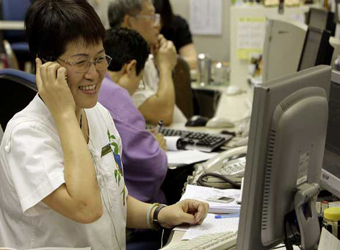In Tokyo, the Nikkei 225 was up 1.43 percent, or 305.94 points, after recording a more than 400-point gain earlier. The broader Topix rose 1.33 percent, with gains seen across all of the index’s 33 sectors.
Over in Seoul, the benchmark Kospi index advanced 1.12 percent
Hong Kong’s Hang Seng Index advanced 1.53 percent, or 472.96 points, as energy and tech names led broad-based gains. Index heavyweight Tencent was up 2.06 percent.
Mainland markets also traded higher, but saw slighter gains: The Shanghai composite edged up by 0.51 percent and the Shenzhen composite added 0.81 percent. Small caps outperformed in the early going, with the ChiNext start-up board up 1.22 percent in comparison with the blue chip CSI 300’s 0.44 percent gain.
Down Under, the S&P/ASX 200 rose 0.74 percent. Gains were led by the materials and energy sub-indexes, which rose 1.75 percent and 1.43 percent respectively, while gold producers slid 1.67 percent.
Steel producers in Asia were in focus after U.S. President Donald Trump tweeted on Friday that he was working with Australian Prime Minister Malcolm Turnbull to ensure that Australia would not face U.S. steel and aluminum tariffs. Shares of Bluescope Steel rose 3.46 percent.
Meanwhile, Japanese and South Korean steel producers recovered after sliding in the last session. The Topix Iron and Steel index was up 1.71 percent, with JFE Holdings up 0.47 percent. Meanwhile, Posco and Hyundai Steel rose 3.19 percent and 2.15 percent, respectively. Trump had signed proclamations to impose tariffs of 25 percent and 10 percent on steel and aluminum imports, respectively, last week, although the door was left open for potential exemptions.
Trump had signed proclamations to impose tariffs of 25 percent and 10 percent on steel and aluminum imports, respectively, last week, although the door was left open for potential exemptions.
Gains in the region came off the back of the surge on Wall Street in the last session.
All three major U.S. stock indexes recorded gains of around 1.7 percent on the release of robust jobs data. The Nasdaq composite, in particular, hit both intraday and closing highs on Friday.
Data released on Friday showed that the U.S. economy added 313,000 jobs last month, above a forecast of 200,000 in a Reuters poll. Wage growth, however, rose 2.6 percent on an annualized basis, coming in below expectations.
The solid job creation numbers and lower-than-expected wage growth eased worries about the Federal Reserve’s rate hike trajectory.
“Fears of four rate hikes from the Fed this year have receded while risk sentiment is back firmly in the ascendancy — for now at least,” Ray Attrill, head of FX strategy at National Australia Bank, wrote in a morning note.
In currencies, the dollar index, which tracks the U.S. currency against a basket of rivals, traded at 90.017 at 12:20 p.m. HK/SIN.
Against the safe-haven yen, the dollar was a touch softer at 106.61, having gained last week on geopolitical developments concerning U.S.-North Korea ties. The Japanese currency also came likely came under pressure after comments from Bank of Japan Governor Haruhiko Kuroda on Friday were seen as dovish by markets.
The Australian dollar last traded at $0.7866.
On the commodities front, oil prices extended gains after bouncing in the last session from recent declines. U.S. West Texas Intermediate rose 0.1 percent to trade at $62.10 per barrel after settling more than 3 percent higher on Friday. Brent crude futures rose 0.12 percent to trade at $65.57.
In individual stocks, Newcrest Mining fell 4.1 percent after the company said in an update that its fiscal 2018 guidance would be “adversely” impacted after identifying a breakthrough of tailings material at its Cadia mine.
Singapore-listed Noble Group surged 21.8 percent. The company said in a release that it had not paid the coupon due Mar. 9, 2018, with respect to $750 million notes due on Mar. 9, 2022.
Source: CNBC
